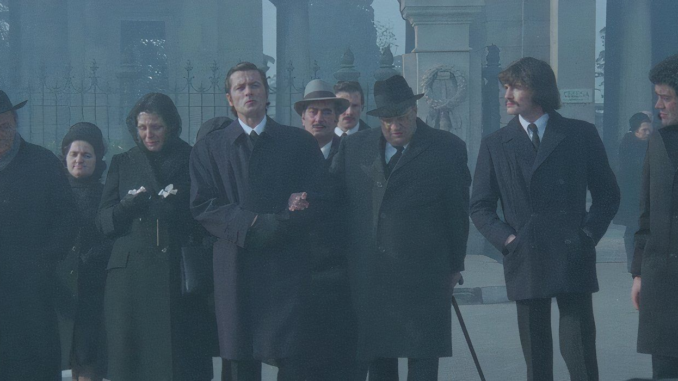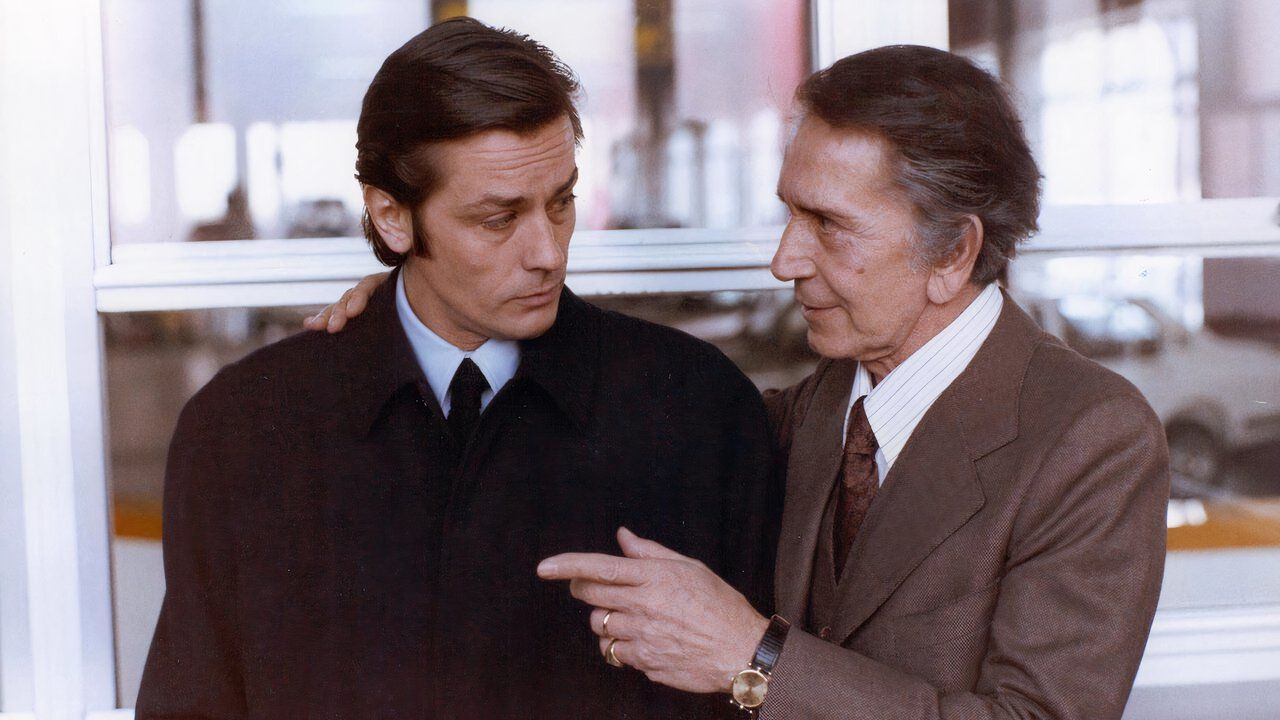
The 1970s proved to be a very entertaining decade in the film industry for a number of reasons. Aside from the New Hollywood era giving rise to many of the greatest directors of all time and featuring many of their classic films, the ’70s also saw a burst of creative titles all over the world in various genres. In America, crime pictures were especially popular after the release of The Godfather in 1972. Throughout the decade, many iconic movies were made in the crime genre, such as Taxi Driver, Death Collector, The Outfit, The Wanderers and Hardcore, among many others. However, in the late ’60s, audiences saw a shift in genre filmmaking all over the world and a lot of European filmmakers were beginning to make a lot more gritty and grounded crime films as well. This trend only increased with the popularity of American films in the ’70s.
One of the most famous international stars at this time was Alain Delon, who appeared in numerous dramas and genre films in various countries all over the world. The French icon was popping up everywhere, in French films directed by Jean-Pierre Melville, Italian films directed by Luchino Visconti and American films directed by Ralph Nelson. Between romantic dramas, thrillers and crime epics, Alain Delon was everywhere and in every kind of role in the ’60s and ’70s. One of his best during that time was an Italian crime thriller from 1973 that went by many names but also had many great moments that made it one of the best European crime films of the ’70s. This underrated gem also has a ton of secret connections to The Godfather that many fans might have missed.

No Way Out Is an Italian Gangster Revenge Epic Nobody Ever Heard Of
It Is One of the Most Underrated Films of the ’70
Many American audiences might not be aware of the myriad of great gangster films and crime epics that came out in the 1970s because the focus remained solely on what was being made in the States. However, other countries were making their own genre films; many were crime and mobster movies. While American gangster movies are the best, there’s nothing like an Italian perspective on Italian organized crime, and that is what fans would get with films like No Way Out.
Not unlike most international films, titles often change when movies are released and re-released in other countries. No Way Out also went by the title Tony Arzenta (the name of the main character) in countries like England and the United States and Big Guns in various other places. No Way Out came out during an interesting time when a few big-name directors in Italy were beginning to dabble in other genres separate from the ones that got their careers started. No Way Out was directed by Duccio Tessari, who audiences would know from his Spaghetti Westerns of the ’60s and giallo films of the ’70s.
With his first foray into the crime genre, Tessari teamed up with Alain Delon to make a gangster film with a “revenge-o-matic” plot at the center of it. Aside from the plot having a very familiar structure, there is an epic scope to the production as well as a tight script and solid performances that make the film work from start to finish. Tessari definitely applies a unique Italian perspective to organized crime with his portrayal of an international crime syndicate that runs most of the criminal activities in Europe. No Way Out follows Tony Arzenta (Alain Delon), the syndicate’s most prized assassin, who seeks vengeance on his bosses when they accidentally kill his wife and son in a botched attempt on his life. With a cool “kill list” structure, Tony slowly wipes out his bosses one at a time until only one remains.
The final confrontation and shocking climax close out the film in exactly the manner fans would expect, and it’s entertaining. There are multiple highlights to point out in the film, including Tessari’s solid action direction, Delon’s performance, the creative murder sequences and an engaging score by Gianni Ferrio. However, one of the coolest parts about No Way Out is how the supporting cast is filled out.
No Way Out Features Multiple Actors From The Godfather
Richard Conte Plays the Main Villain Once Again
On the whole, No Way Out is flourishing with European and American talent, as most of the supporting cast in the film consists of actors and actresses from various popular films all over the world. Whether it be Marc Porel from Lucio Fulci’s The Psychic, Nicoletta Machiavelli from Sergio Corbucci’s Navajo Joe or Anton Diffring from John Guillerman’s The Blue Max. Throughout Tony’s journey to murder the men who killed his family, Delon continues to cross paths with multiple familiar actors. However, a few of the actors in the film have connections to the most popular gangster drama of all time. One of the actors in the film might not even get recognized because of how little screen time he has and how small his role is.
Corrado Gaipa makes a small but important appearance as Tony Arzenta’s father. For an actor like Gaipa, his character needed to have a significant part to play at some point throughout the progression of the story, especially considering that he had just played Don Tommasino in the Sicily sequences of The Godfather a year earlier. As it turns out, Gaipa’s character would have one of the most important lines of dialogue in No Way Out when Tony needed advice and guidance only a father could give.
Meanwhile, one of the main characters in the film is played by none other than Richard Conte. The Italian-American actor should be very recognizable to fans who have seen The Godfather. Richard Conte is very good at playing the villain character, and a year prior to No Way Out, his character in The Godfather turned out to be the biggest villain of the entire film. Throughout Michael Corleone’s journey in the film, he has to learn very quickly when people are being honest or looking to betray him. A key piece of the film comes when his father warns him and Tom Hagen that Barzini is the real enemy of the Corleone Family.
Conte’s role as Barzini is remembered because he played a very subtle villain who seems to be an ally of Don Corleone initially, only to be revealed as the worst enemy of all as the film goes on. Barzini meets his fate in the iconic baptism sequence when Michael Corleone wipes out the various heads of the five families. In No Way Out, Richard Conte plays the main villain once again as one of the leading members of the international crime syndicate that is portrayed. He is the main boss of Tony at the start of the film, the reason Tony’s family is dead, and the main boss Tony has to kill at the end of the movie. Things played out in an interesting way, but nonetheless, Conte’s role was an entertaining nod to his most famous character from the same decade.
The Godfather Influenced a Wave of Crime Movies In Italy
No Way Out Was Just One of Many Films Inspired by the 1972 Classic
No Way Out came out just one year after The Godfather and was actually an early example of films that would begin to be made more frequently in Italy throughout the ’70s. Similarly to how Hitchcock and American cinema influenced Italy’s giallo slasher movies and how Italy’s Spaghetti Westerns influenced America’s ’70s revisionist Westerns, The Godfather was a huge influence on Italian crime movies in the ’70s and ’80s. Many iconic Italian directors started out in similar ways: making some of the best Westerns of all time in the ’60s. Whether as assistant directors, camera crew, writers or producers, most of the talent involved in Sergio Leone’s “Dollars Trilogy” went on to make their own influential films in different genres.
Duccio Tessari was no exception, and as one of the writers of A Fistful of Dollars, he would go on to make his own iconic films in Italy for the next decade. Many directors during this time were making films inspired by The Godfather, and no one did it better than Fernando Di Leo. Di Leo was another writer who worked on Leone’s “Dollars Trilogy” and his forte would become crime films in the ’70s. Di Leo’s films include classics such as Caliber 9, The Boss, Shoot First, Die Later and Rulers of the City. What Di Leo was to crime films in Italy, Leone and Corbucci were to Westerns and Argento and Tessari were to giallos. A
ll started in the same place, and all went on to have influential careers. Tessari’s 1973 gem was just one film in the crime genre at the time made when the audience craved the genre most, and was directly influenced by the success of The Godfather.
